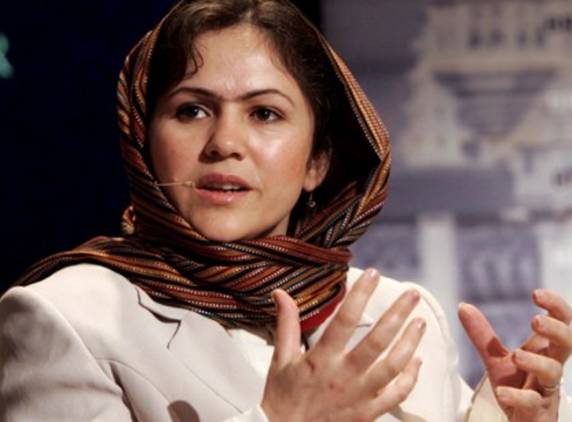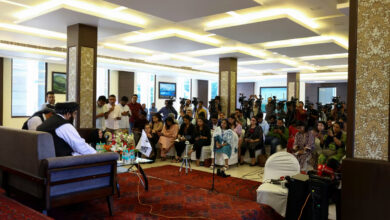
Leading Afghan women's rights champion, author, lawmaker and presidential hopeful Fawzia Koofi has a revealing anecdote about life as a woman in a man's land.
As she walked out of the Presidential Palace in Kabul recently, a conservative male parliamentary colleague approached her and said: "'Ms. Koofi, if you would really like to live in a palace — because you are running for the presidency — why don't you get married to a president'?"
Even now, weeks later, Koofi's steady brown eyes flash at the memory.
"It really made me feel angry, because that's how they see it," Koofi told AFP in an interview in her Kabul home.
"If a woman would like to become a president it's not because she's qualified for it, it's because she would like to live in a palace!"
In a riposte, she told her colleague pointedly that, unlike some men with dubious pasts in Afghanistan's 30 years of conflict, she had no need to hide in the security of a palace.
"I'm happy sometimes when they oppose me because it means I'm something to them, they feel I am strong — and I also give them the required punch, I think," she said.
Named this year as one of the world's "150 Fearless Women" by US website The Daily Beast, Koofi, 36, is a widow with two young girls who are addressed in her memoir, "Letters to my Daughters."
It is a tale of courage and passion in the face of the overwhelming challenges faced by a girl growing up in a country sometimes called the worst place in the world to be a woman.
She was left in the sun to die immediately after her birth by her exhausted and depressed mother — one of seven wives in a family of 23 children — who knew that another girl would not win her husband's approval, she writes.
The baby Koofi lay alone, screaming and sunburned, for almost a day until pity prevailed and she was returned to her repentant mother — to start a close and loving relationship.
The sunburn scars lasted into her teens, but they — and any psychological scars — are undetectable in this elegant and confident woman in a pale pink headscarf and cream tunic over matching trousers.
Pictures of two men find space on the walls of Koofi's rented home near parliament: one a portrait of a stern-faced father, the other shows her and President Hamid Karzai.
Her father, a politician murdered when Koofi was just 3, spoke directly to her only once, and that was to tell her to go away, she writes in her memoir.
And she is not a fan of Karzai.
She accuses the president, who is backed by 130,000 NATO troops, of being prepared to compromise on women's rights for political gain among conservatives, including Taliban insurgents.
The Taliban, ousted from power in a US-led invasion in 2001, banned girls from going to school, whipped women in the street if they wore anything other than the all-enveloping burqa and stoned to death those accused of adultery.
Even now, there are more guns than women on the streets of Kabul.
But Koofi — who managed to get a good education against the odds — says the past 10 years have provided "golden opportunities" for women.
Her biggest fear is that these gains will be the first to be sacrificed in efforts to bring the Taliban into reconciliation talks, and perhaps even a sharing of power after NATO troops pull out in 2014.
"Compromise is happening already. Talibanization is a process, people within government are already promoting Taliban ideology and Taliban thinking," she said.
"There is great uncertainty and confusion about the future, and worry and concern among women."
In March, Karzai indicated support for an edict by the Ulema Council, the nation's highest Islamic authority, saying "men are fundamental and women are secondary."
The edict went on to list a series of prohibitions against women, including working in the same offices as men and traveling without a male companion, and suggested that in some circumstances wife-beating was appropriate.
Karzai "openly supported this, he said this is what the people of Afghanistan want," said Koofi, who chairs parliament's women and human rights committee.
"I don't think this is what they want. It is true we are all Muslims, but our understanding of Islam is different from the understanding of the Taliban.
"Lots of things have changed for the good for women. There has been lots of progress for women in the political arena, girls in school and higher education, laws providing protection for women.
"Having said that, Afghanistan is still the worst place in the world to be a mother, and there are still a lot of women suffering from domestic violence and torture even."
Koofi urges the West to continue its support for Afghan women's rights even after the withdrawal — and is committed to doing all she can herself, even if it means risking her life.
"Being a woman in politics in Afghanistan and a woman who stands for what she believes in, there is always risk, it is always dangerous," she said.
"I have already been so many times a target for assassination and even kidnapping. But I think somebody has to take the risk."
Koofi said she is determined to run for president in the 2014 elections, when Karzai is due to complete his limit of two five-year terms, if there is a chance that they will be free and fair.
She dismisses forecasts that she would be trounced in such a male-dominated country, saying there is a strong desire for change among young people, women, the educated elite — and even in rural villages.
She was elected as a member of parliament for remote and rural Badakhshan, her home province, "where people 10 years back would have been strongly against women — now they voted for me".
"So change is possible, it's just a matter of some political and moral support from our international friends."
As the interview draws to a close, Koofi proudly brings her daughters in for a final photograph: the girls, aged 12 and 13, have been playing tennis, one of the many simple pleasures banned for Afghan women just a decade ago.




